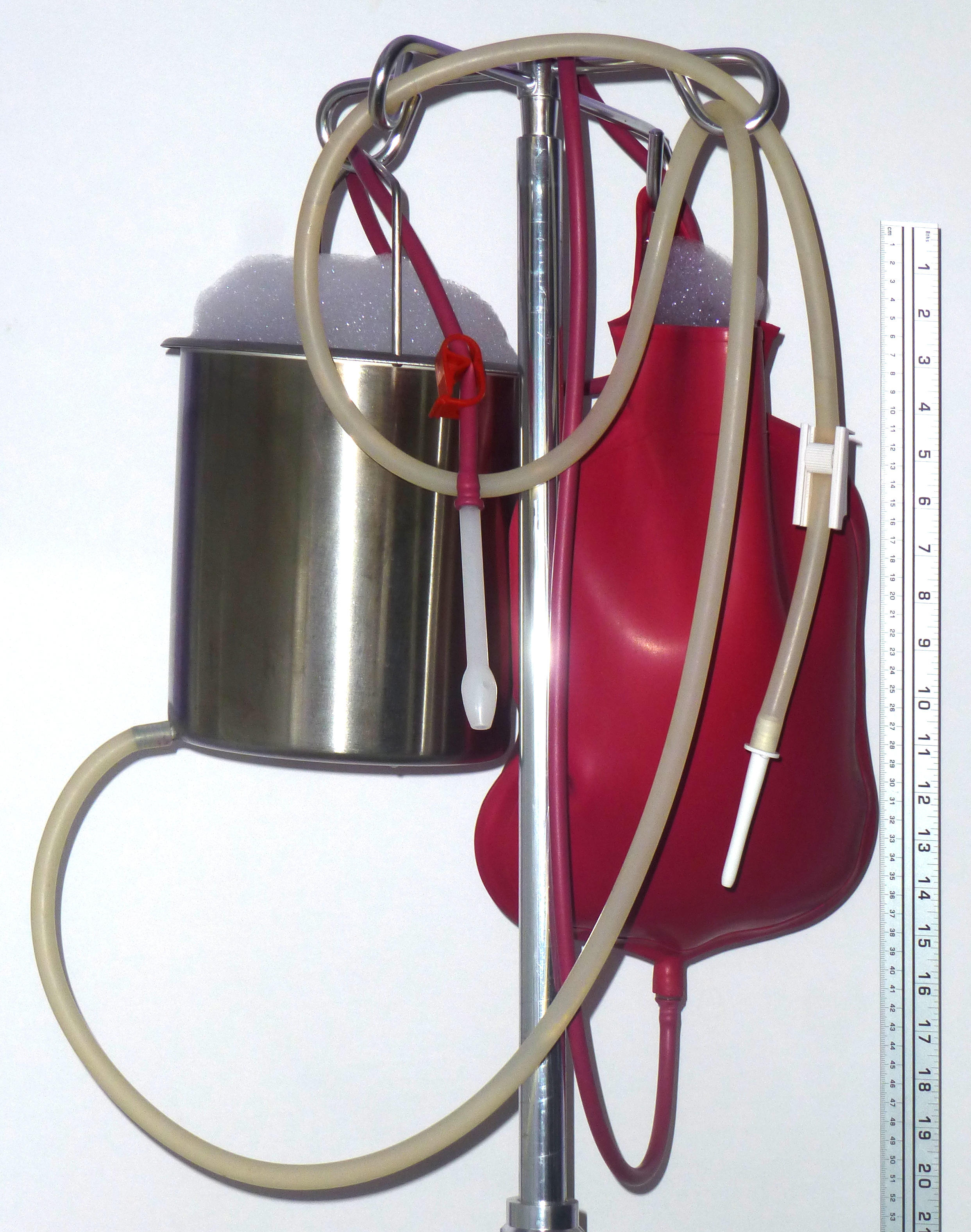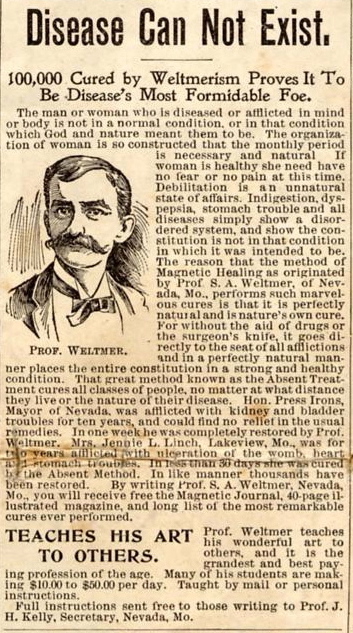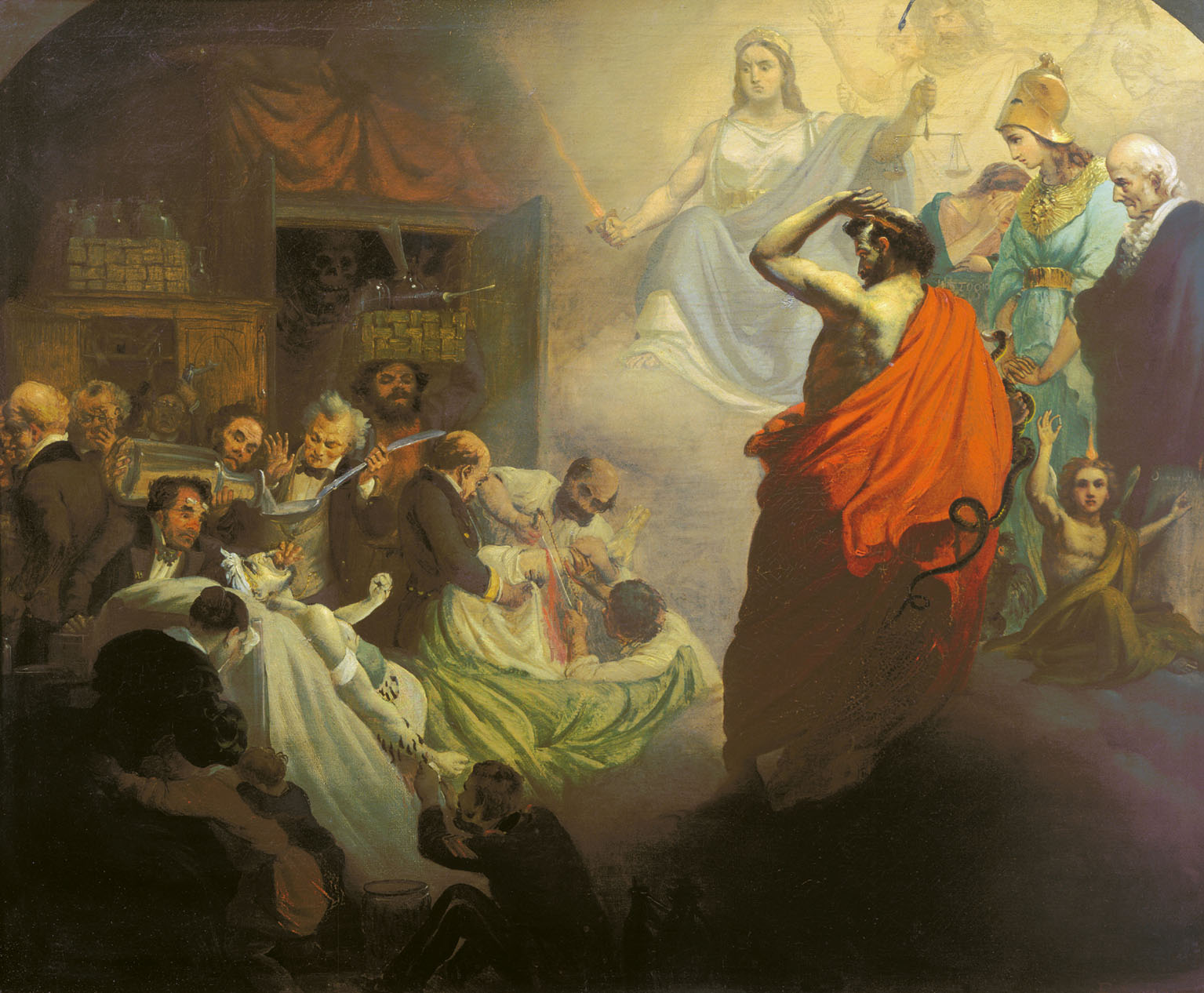|
Naturopathy
Naturopathy, or naturopathic medicine, is a form of alternative medicine. A wide array of pseudoscientific practices branded as "natural", "non-invasive", or promoting "self-healing" are employed by its practitioners, who are known as naturopaths. Difficult to generalize, these treatments range from outright quackery, like homeopathy, to widely accepted practices like certain forms of psychotherapy. The ideology and methods of naturopathy are based on vitalism and folk medicine rather than evidence-based medicine, although practitioners may use techniques supported by evidence. Naturopathic practitioners commonly recommend against following modern medical practices, including but not limited to medical testing, drugs, vaccinations, and surgery. Instead, naturopathic practice relies on unscientific notions, often leading naturopaths to diagnoses and treatments that have no factual merit. Naturopathy is considered by the medical profession to be ineffective and harmful, raisin ... [...More Info...] [...Related Items...] OR: [Wikipedia] [Google] [Baidu] |
Quackery
Quackery, often synonymous with health fraud, is the promotion of fraudulent or ignorant medical practices. A quack is a "fraudulent or ignorant pretender to medical skill" or "a person who pretends, professionally or publicly, to have skill, knowledge, qualification or credentials they do not possess; a charlatan or snake oil salesman". The term ''quack'' is a clipped form of the archaic term ', from nl, kwakzalver a "hawker of salve". In the Middle Ages the term ''quack'' meant "shouting". The quacksalvers sold their wares on the market shouting in a loud voice. Common elements of general quackery include questionable diagnoses using questionable diagnostic tests, as well as untested or refuted treatments, especially for serious diseases such as cancer. Quackery is often described as "health fraud" with the salient characteristic of aggressive promotion. Definition Psychiatrist and author Stephen Barrett of Quackwatch defines quackery "as the promotion of unsubstanti ... [...More Info...] [...Related Items...] OR: [Wikipedia] [Google] [Baidu] |
Benedict Lust
Benedict Lust (February 3, 1872 – September 5, 1945) was a German-born American who was one of the founders of naturopathic medicine in the first decades of the twentieth century. Biography Lust was born in Michelbach, Baden, Germany.Anonymous. (1945)''The National Cyclopaedia of American Biography, Volume 32'' New York: James T. White & Company. pp. 505-506. As a youth, he became ill and was treated by Fr. Sebastian Kneipp, a famous advocate of the water cure system. In 1892, he moved to the United States as Kneipp's official water cure representative. Lust attended the New York Preparatory College. He graduated from the Universal Osteopathic College in 1897 and the Eclectic and Naturopathic College in 1904. He received an M.D. from the Eclectic Medical College of New York in 1914. In 1896, Lust began his career as a naturopath by opening a health center and health food store in New York City. He also opened the New York School of Massage in 1896 and the American School of Ch ... [...More Info...] [...Related Items...] OR: [Wikipedia] [Google] [Baidu] |
Alternative Medicine
Alternative medicine is any practice that aims to achieve the healing effects of medicine despite lacking biological plausibility, testability, repeatability, or evidence from clinical trials. Complementary medicine (CM), complementary and alternative medicine (CAM), integrated medicine or integrative medicine (IM), and holistic medicine attempt to combine alternative practices with those of mainstream medicine. Alternative therapies share in common that they reside outside of medical science and instead rely on pseudoscience. Traditional practices become "alternative" when used outside their original settings and without proper scientific explanation and evidence. Frequently used derogatory terms for relevant practices are ''new age'' or ''pseudo-'' medicine, with little distinction from quackery. Some alternative practices are based on theories that contradict the established science of how the human body works; others resort to the supernatural or superstitious to explain ... [...More Info...] [...Related Items...] OR: [Wikipedia] [Google] [Baidu] |
Sebastian Kneipp
Sebastian Kneipp (17 May 1821 – 17 June 1897) was a German Catholic priest and one of the forefathers of the Naturopathy, naturopathic medicine movement. He is most commonly associated with the "Kneipp Cure" form of hydrotherapy (often called "Kneipp therapy" or "Kneippism"), the application of water through various methods, temperatures and pressures, which he claimed to have therapeutic or healing effects, thus building several hospitals in Bad Wörishofen. Although most commonly associated with one area of Self-healing, nature cure, Kneipp was the proponent of an entire system of healing, which rested on five main tenets: * Hydrotherapy – The use of water to treat ailments * Phytotherapy – The use of botanical medicines was another of Kneipp's specialties * Exercise – Promoting health of the body through movement * Nutrition – A wholesome diet of whole grains, fruits, and vegetables with limited meat. * Self-care, Balance – Kneipp believed that a healthy mind beg ... [...More Info...] [...Related Items...] OR: [Wikipedia] [Google] [Baidu] |
Alternative Medicine
Alternative medicine is any practice that aims to achieve the healing effects of medicine despite lacking biological plausibility, testability, repeatability, or evidence from clinical trials. Complementary medicine (CM), complementary and alternative medicine (CAM), integrated medicine or integrative medicine (IM), and holistic medicine attempt to combine alternative practices with those of mainstream medicine. Alternative therapies share in common that they reside outside of medical science and instead rely on pseudoscience. Traditional practices become "alternative" when used outside their original settings and without proper scientific explanation and evidence. Frequently used derogatory terms for relevant practices are ''new age'' or ''pseudo-'' medicine, with little distinction from quackery. Some alternative practices are based on theories that contradict the established science of how the human body works; others resort to the supernatural or superstitious to explain ... [...More Info...] [...Related Items...] OR: [Wikipedia] [Google] [Baidu] |
History Of Alternative Medicine
The history of alternative medicine refers to the history of a group of diverse medical practices that were collectively promoted as "alternative medicine" beginning in the 1970s, to the collection of individual histories of members of that group, or to the history of western medical practices that were labeled "irregular practices" by the western medical establishment.Countercultural Healing: A brief History of Alternavie Medicine in America, James Whorton, PBS, Nov 4 2003, Nature Cures – The History of Alternative Medicine in America, James C. Whorton, Oxford University Press, 2002, The Rise and Rise of Complementary and Alternative Medicine: a Sociological Perspective, Ian D Coulter and Evan M Willis, Medical Journal of Australia, 2004; 180 (11): 587–89 It includes the histories of complementary medicine and of integrative medicine. "Alternative medicine" is a loosely defined and very diverse set of products, practices, and theories that are perceived by its users to h ... [...More Info...] [...Related Items...] OR: [Wikipedia] [Google] [Baidu] |
Homeopathy
Homeopathy or homoeopathy is a pseudoscientific system of alternative medicine. It was conceived in 1796 by the German physician Samuel Hahnemann. Its practitioners, called homeopaths, believe that a substance that causes symptoms of a disease in healthy people can cure similar symptoms in sick people; this doctrine is called '' similia similibus curentur'', or "like cures like". Homeopathic preparations are termed ''remedies'' and are made using homeopathic dilution. In this process, the selected substance is repeatedly diluted until the final product is chemically indistinguishable from the diluent. Often not even a single molecule of the original substance can be expected to remain in the product. Between each dilution homeopaths may hit and/or shake the product, claiming this makes the diluent remember the original substance after its removal. Practitioners claim that such preparations, upon oral intake, can treat or cure disease. All relevant scientific knowledge about ... [...More Info...] [...Related Items...] OR: [Wikipedia] [Google] [Baidu] |
Homeopathic
Homeopathy or homoeopathy is a pseudoscientific system of alternative medicine. It was conceived in 1796 by the German physician Samuel Hahnemann. Its practitioners, called homeopaths, believe that a substance that causes symptoms of a disease in healthy people can cure similar symptoms in sick people; this doctrine is called '' similia similibus curentur'', or "like cures like". Homeopathic preparations are termed ''remedies'' and are made using homeopathic dilution. In this process, the selected substance is repeatedly diluted until the final product is chemically indistinguishable from the diluent. Often not even a single molecule of the original substance can be expected to remain in the product. Between each dilution homeopaths may hit and/or shake the product, claiming this makes the diluent remember the original substance after its removal. Practitioners claim that such preparations, upon oral intake, can treat or cure disease. All relevant scientific knowledge about ... [...More Info...] [...Related Items...] OR: [Wikipedia] [Google] [Baidu] |
Greek Language
Greek ( el, label=Modern Greek, Ελληνικά, Elliniká, ; grc, Ἑλληνική, Hellēnikḗ) is an independent branch of the Indo-European family of languages, native to Greece, Cyprus, southern Italy (Calabria and Salento), southern Albania, and other regions of the Balkans, the Black Sea coast, Asia Minor, and the Eastern Mediterranean. It has the longest documented history of any Indo-European language, spanning at least 3,400 years of written records. Its writing system is the Greek alphabet, which has been used for approximately 2,800 years; previously, Greek was recorded in writing systems such as Linear B and the Cypriot syllabary. The alphabet arose from the Phoenician script and was in turn the basis of the Latin, Cyrillic, Armenian, Coptic, Gothic, and many other writing systems. The Greek language holds a very important place in the history of the Western world. Beginning with the epics of Homer, ancient Greek literature includes many works of lasting impo ... [...More Info...] [...Related Items...] OR: [Wikipedia] [Google] [Baidu] |
Surgery
Surgery ''cheirourgikē'' (composed of χείρ, "hand", and ἔργον, "work"), via la, chirurgiae, meaning "hand work". is a medical specialty that uses operative manual and instrumental techniques on a person to investigate or treat a pathological condition such as a disease or injury, to help improve bodily function, appearance, or to repair unwanted ruptured areas. The act of performing surgery may be called a surgical procedure, operation, or simply "surgery". In this context, the verb "operate" means to perform surgery. The adjective surgical means pertaining to surgery; e.g. surgical instruments or surgical nurse. The person or subject on which the surgery is performed can be a person or an animal. A surgeon is a person who practices surgery and a surgeon's assistant is a person who practices surgical assistance. A surgical team is made up of the surgeon, the surgeon's assistant, an anaesthetist, a circulating nurse and a surgical technologist. Surgery usually spa ... [...More Info...] [...Related Items...] OR: [Wikipedia] [Google] [Baidu] |
Hippocrates
Hippocrates of Kos (; grc-gre, Ἱπποκράτης ὁ Κῷος, Hippokrátēs ho Kôios; ), also known as Hippocrates II, was a Greek physician of the classical period who is considered one of the most outstanding figures in the history of medicine. He is traditionally referred to as the "Father of Medicine" in recognition of his lasting contributions to the field, such as the use of prognosis and clinical observation, the systematic categorization of diseases, or the formulation of humoral theory. The Hippocratic school of medicine revolutionized ancient Greek medicine, establishing it as a discipline distinct from other fields with which it had traditionally been associated (theurgy and philosophy), thus establishing medicine as a profession. However, the achievements of the writers of the Hippocratic Corpus, the practitioners of Hippocratic medicine, and the actions of Hippocrates himself were often conflated; thus very little is known about what Hippocrates actually t ... [...More Info...] [...Related Items...] OR: [Wikipedia] [Google] [Baidu] |
Latin
Latin (, or , ) is a classical language belonging to the Italic branch of the Indo-European languages. Latin was originally a dialect spoken in the lower Tiber area (then known as Latium) around present-day Rome, but through the power of the Roman Republic it became the dominant language in the Italian region and subsequently throughout the Roman Empire. Even after the fall of Western Rome, Latin remained the common language of international communication, science, scholarship and academia in Europe until well into the 18th century, when other regional vernaculars (including its own descendants, the Romance languages) supplanted it in common academic and political usage, and it eventually became a dead language in the modern linguistic definition. Latin is a highly inflected language, with three distinct genders (masculine, feminine, and neuter), six or seven noun cases (nominative, accusative, genitive, dative, ablative, and vocative), five declensions, four verb conjuga ... [...More Info...] [...Related Items...] OR: [Wikipedia] [Google] [Baidu] |









.jpg)
